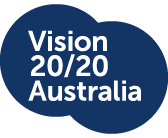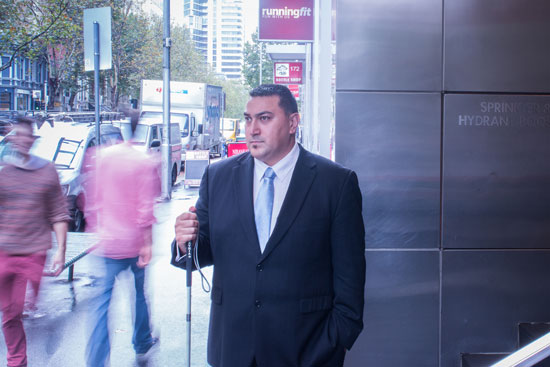Leadership Inspiring Change
Vision 2020 Australia’s own Director of Policy and Advocacy, Brandon Ah Tong, talks about how living with disabiltiy has helped him understand the importance policy that better reflects how we live and addresses the needs of individuals.
- What was your inspiration to enter your chosen profession?
I’ve always had a strong social conscience. When I was in primary school and kids in the playground were picking teams for a rugby game or something, I was one of those kids that always wanted to make sure that everyone got picked and didn’t get left out. I think this same sense of fairness followed me through to adulthood and a feeling that I need to do something about inequity I saw around me.
I also naturally gravitate to the big picture, and people like Nelson Mandela and Gandhi are figures that stood out for me. Partly because they were about social equity and partly because they were about seeing change for the better for everyone. So I think working in public and social policy, where the outcomes are about systemic change on a macro level, really seemed like a good fit for me.
- What do you want to see happen in your field?
I think policy still puts people into different boxes and tries to separate people’s lives into neat little segments, but people aren’t that simple. Likewise, I think the legacy of past policies, have caused some people to remain guarded about engaging with different policy areas that have damaged them in the past.
A good example of this is the aversion of some people with disability to talk about issues of health and disability together. This is due to the old medical approach to disability that only saw people with disability as objects of treatment, and disregarding the disabling effects of social attitudes and environmental barriers. Living with disability myself, I do understand this but I think continuing to be limited by attitudes and approaches from the past, limits how we think about new solutions to problems and to me, limits how we can shape policy that better reflects how we live.
So what I’d like to see in the future is an approach to policy, by both policy makers and individuals that better appreciates the complexity of human experience. An approach that looks to address the various needs of individuals within community rather than breaking community into groups of people with needs. The difference is subtle but I think quite fundamental, with one approach empowering people to move through a policy continuum according to their needs, and the other limiting policy, by certain types of people, which is not necessarily reflective of their needs.
- How do you see the work that you do contributing towards this goal?
Working with Vision 2020 Australia means that I get to reach across various elements of the policy divide and help to continue to smooth the edges around vision loss and vision impairment. In particular, our area of work involves health, disability, aged care, Indigenous health, foreign affairs and much more. Vision 2020 Australia tries to achieve better eye health and vision care outcomes, but also better outcomes for people living with unavoidable blindness and vision impairment.
What we do, I think, is really important in trying to narrow some of those divides, but I also think what we do is also something that is not unique to blindness and vision loss, but an approach that has lessons for other interest groups.
I do have to say though, that in my line of work, there is never a single individual responsible for any one thing. Policy and advocacy is always a team effort, both within my organisation, but also across our members, stakeholders and policy makers and department officials. Policy is a long game that needs so many people to help make it work, so any part I play, is only ever one small part within a massive piece of machinery that is policy.
- What drives you to achieve this goal?
I think it’s probably a combination of a social conscience, an appreciation of history and my own experience living with disability. Having a keen sense of fairness from my upbringing seemed to only grow once I went to university and started learning and reading about times past and the various struggles around the world for equality by those who have gone before me. And becoming vision impaired later in life and discovering that the world is largely set up for only certain people, I think has given me a personal stake in needing to play my role now in this time to make the world a better place for those who come after me.
As a great mentor of mine said to me when I first started out about ten years ago, when I wasn’t sure which field of policy to get into: “dig where your feet are standing”.
So I’m digging.
- What does leadership mean to you?
I think good leadership is about sharing ones passion through action. When I think about leaders who inspire me, all of them are people who led through example. So leadership to me probably comes down to being passionate and walking the walk.

